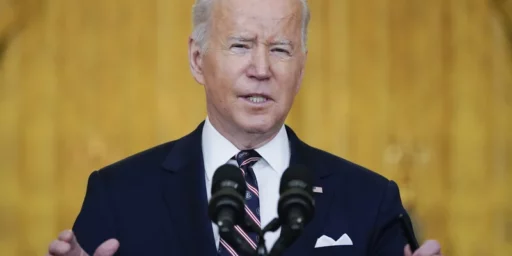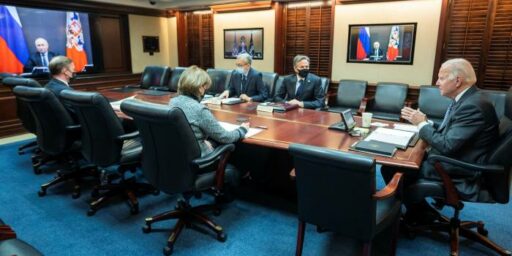Two Great Articles on the Ukraine Crisis
One of the best opinion pieces on the situation in the Ukraine that I’ve read so far is this one by Fred Kaplan at Slate. It’s worth reading in full but here’s his conclusion:
Right now, then, this is at most a regional conflict, not a global one, and the best thing that Obama can do—in both his threats and his inducements—is to keep it that way. Certain Republicans on Capitol Hill could help. Senators like John McCain and Lindsey Graham, who used to know better, could lay off their absurd yelping about Obama’s “weakness” and “feckless leadership.” For one thing, it’s not true; at least when it comes to this crisis, they’ve recommended very few steps that Obama hasn’t already taken. If they’re really worried about Putin’s perceptions of America, instead of merely clamoring to make political points with GOP extremists, they should stand by the president and make sure Putin understands that, on this issue, there are no domestic fissures for him to exploit.
The other piece which inspired Mr. Kaplan’s shorter article was written by the scholar of strategy Lawrence Freedman and appears at War on the Rocks. It’s entitled “Ukraine and the Art of Crisis Management”. It’s quite lengthy but it’s well worth reading. Here are some samples:
The basic challenge of crisis management is to protect core interests while avoiding major war. In the Cold War lexicon, the concept had had some connections to “coercive diplomacy.” This latter concept refers to the use of threats to persuade an opponent to change policies, either in the form of deterrence, so that an aggressive move is not made, or compellence, to reverse an aggressive move that has been made. Thus deterrence says “do not annex Crimea or else”, while compellence says “you must release Crimea from annexation or else”. Deterrence works best when set in place long before a crisis erupts, while compellence tends to come into play during a crisis, although in circumstances where it may only succeed with overwhelming power. In practice it may be inhibited by a keen awareness of how wrong moves might be inflammatory and counter-productive. Crisis management therefore may well involve coercive diplomacy, but built into the concept is a sense of knowing when to exercise restraints and respect limits.
and
Out of this we can identify five qualities relevant to the art of crisis management:
- Clarity over core interests;
- A sense of both the possibilities and limits of coercive instruments, including where the actual use of armed force might be appropriate;
- Control over armed forces to prevent inadvertent or deliberate military escalation;
- Sustained communications with the adversary;
- A grasp of what the adversary needs to enable it to de-escalate, or at least to desist from further escalation.
When proposing a course of action for the United States with respect to the situation in the Ukraine or, indeed, any crisis it might be prudent to evaluate your proposal through the prism of those qualities.
and
Many commentators have given Western countries poor marks so far for its crisis management over Ukraine. The failures have variously been described to be: (1) Easing President Putin’s risk calculus with an evident reluctance to take forceful positions in recent crises, for example over Syria, and looking for diplomatic exit routes over Iran; (2) Failing to appreciate the developing logic of Putin’s fear of liberal democracy and his assertiveness both at home and in Russia’s “near abroad”; (3) Paying inadequate attention to the full implications of what was going on in Kiev in February 2014 and supporting what was, in the end, an anti-democratic seizure of power; (4) Offering only feeble responses to the Russian move into Crimea at the end of that month.
He largely dismisses the first alleged failure but gives more credence to the charge of inattention.
Read the whole thing.





I was just going to recommend the Kaplan piece to you. I’ve not time to read the longer piece, but I like how Kaplan argues for the proper staging of consequences to better effect future deterrence, and not become obsessed about past infractions. Also, in terms of throwing money at Ukraine, it would be better if EU countries bought more goods from Ukraine and tried to find ways to improve foreign investment, at least for now without an EU association agreement.
“This leaking is creating a damaging press row. I can’t allow the Cabinet to seem divided.” “It is divided.” “That’s why it mustn’t look it.”
I believe that the hawks seriously underestimate how far Putin is willing to go in Russia’s front yard, and I doubt they have the will to match the show of strength they want to display. Other than dropping a few bombs, the idea of military force is ludacris, and Putin knows it.
Fred Kaplan has seriously overestimated the liberal tendencies of Putin. Putin is more like Genghis Khan than Ghandi.
Ukraine will never ever be part of NATO or the EU. Period. I predict that Putin would consider using tactical nuclear weapons if necessary.
The way that you apply pressure to Russia is through its client states, but this would require throwing out the playbook.
@TastyBits:
This is how you apply pressure to Russia:
Russia Cancels Bond Auctions as Ruble Slides, Yields Climb
Russia needs access to the rest of the world’s financial markets more than the rest of the world’s financial markets need access to Russia.
@Stormy Dragon:
Will this work quicker than any other sanctions have worked? Also, anybody who needs oil or gas from Russia needs Russia to have access to financial markets, and let us not forget, most people have no problem buying anything from the black market.
The same countries sanctioning Iran are clamoring to lift the sanctions. They want to begin doing business with Iran. I predict it will be the same with Russia.
I hate to be the turd in the punchbowl, but where there is money to be made, humans are going to make it one way or another.
@TastyBits:
Yes; since sanctions are artificially imposed, the trading partners still exist if Russia can get to them through black or grey markets.
If Russian debt becomes risky to the point where no one actually wants to buy it, Russia has a big problem on their hands.
A small datapoint on the Russian economy from the extremely narrow slice that affects my business: We missed our numbers in the Emerging Market last year by a tiny (but significant to Wall Street) amount. We would have squeaked it out except that the floor fell completely out of the Russian business. A very large part of the hospital supply business in Russian is directly negotiated with government entities and their entire multi-year plan went out the window. Tenders withdrawn, replacement equipment put on hold, repairs to existing equipment squeezed. Why, we asked? The Olympics. The funds were diverted to Solchi.
Does this sound like a mature government or a tinpot banana republic? (Without the bananas, of course)